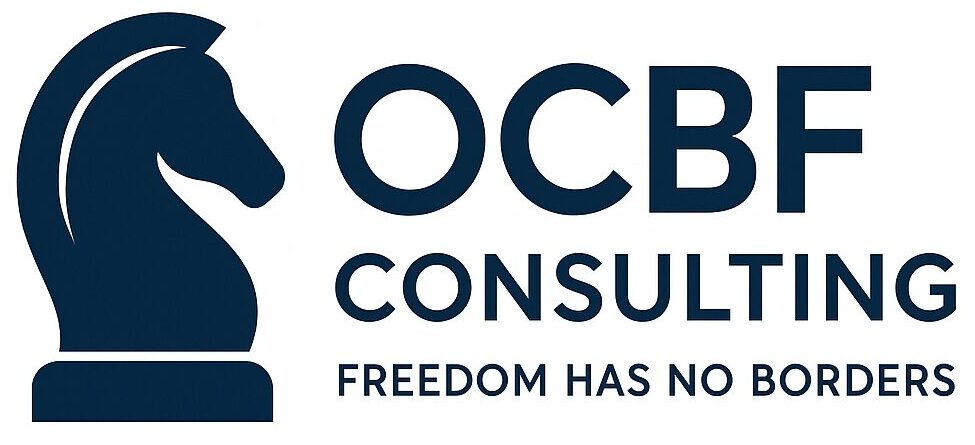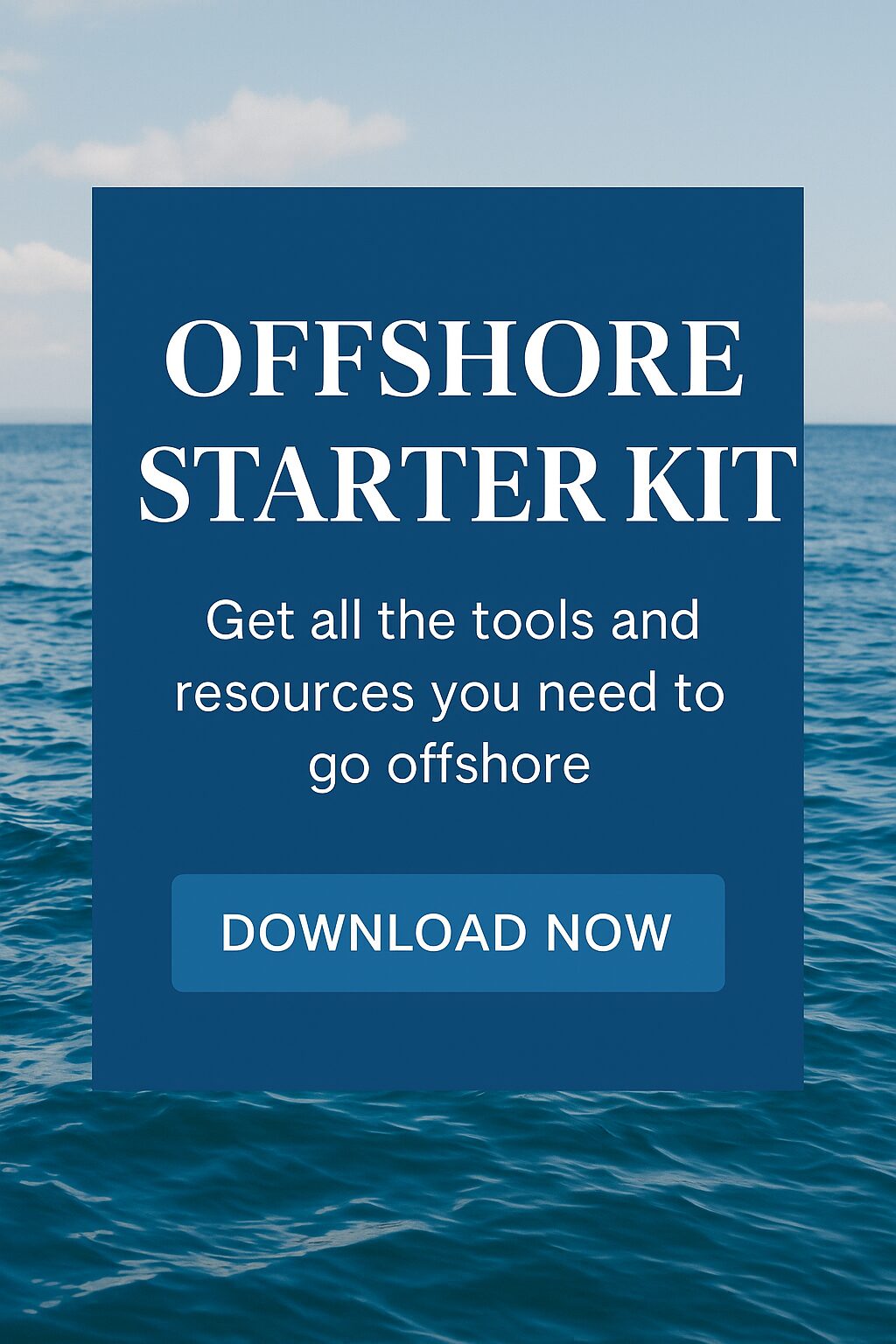The rain was easing over Lisbon’s Alfama district when Maya tapped her laptop awake.
Her morning ritual had become almost ceremonial: log in to Wise to check yesterday’s client payments, sweep euros into USD, glance at her Xero dashboard, then flip open a ProtonMail tab to scan messages from her registered agent in Belize. Between coffee refills, she toggled through Revolut Business, Binance, and her Cook Islands trust dashboard — a choreography of the best tools to manage your offshore life that, somehow, held her nomadic life together.
The Offshore Banking Quick Start Guide is a 70+ page, no-fluff blueprint that takes you from “I don’t know what to do” to submitting a bank-ready offshore application with confidence.
Get the Offshore Banking Quick Start Guide ($9)
For a generation of global citizens, entrepreneurs, and remote professionals, this scene has become the norm. The new expat doesn’t carry a leather briefcase of documents — they carry a digital infrastructure. Their “office” is an encrypted cloud; their “bank branch,” a phone app. And managing this mosaic of offshore accounts, residencies, wallets, and compliance obligations has quietly become one of the most complex — and fascinating — challenges of modern mobility.
Welcome to the offshore life, version 2025: where your passport might have changed, but your password manager is your most valuable possession.
From Islands to Interfaces
Twenty years ago, going offshore meant secrecy. It meant lawyers, faxes, and bank visits in Caribbean humidity.
Today, it’s dashboards, biometrics, and 2FA. The islands haven’t vanished; they’ve been virtualized.
The digital transformation of the offshore world has been revolutionary. Banking that once required an in-person visit can now be done on a phone in a Bangkok café. Trust documents are signed through DocuSign. Corporate filings are managed through portals that update in real time. Even e-Residency — once a novelty — has become a viable alternative to physical incorporation in several countries.

This transformation hasn’t just changed how we manage money; it’s changed who can. Offshore life is no longer reserved for ultra-wealthy industrialists or shadowy tax exiles. It’s the domain of designers in Bali, software engineers in Tallinn, traders in Dubai, and consultants who treat airports like coworking spaces.
But freedom creates friction. Managing this borderless existence demands tools that balance agility with legality — tools that respect privacy without crossing lines of compliance.
So what does that digital toolkit look like?
The Offshore Tech Stack: Building a Borderless Office
Think of your offshore life as an operating system: every tool you use either protects you, connects you, or exposes you. The best ones do all three seamlessly.
The financial backbone starts with multicurrency banking platforms like Wise, Revolut Business, and Dukascopy, which have replaced the old offshore account for most nomads. They let you hold and transfer funds across dozens of currencies without the bureaucracy of traditional banks. Revolut now offers business accounts compatible with offshore LLCs, and Wise allows entity-level onboarding for several jurisdictions.
Layered on top are crypto and investment tools. Binance’s new “Institutional” accounts, or SwissBorg for EU users, allow corporate-owned wallets and trading under AML-compliant frameworks. Portfolio tracking platforms like CoinTracking or Koinly automatically generate tax reports that sync with both crypto and fiat data — a small miracle in 2025’s reporting maze.
Then comes your company layer. Digital nomads often juggle an LLC in one country, clients in another, and tax residency in a third. Tools like Xero and QuickBooks Online integrate directly with multicurrency accounts, letting you reconcile transactions automatically. For structural oversight, platforms like EspoCRM (self-hosted for privacy) or Notion workspaces have become the command center for entity management — invoices, filings, renewals, all in one place.
Document control has become its own science. The rise of privacy-first cloud systems like Tresorit, Proton Drive, and Internxt means sensitive records — company certificates, trust deeds, passports — can be stored encrypted, outside the reach of major U.S. data jurisdictions. Combine that with e-signature platforms such as SignNow or DocuSign, and paperless offshore management is complete.
Finally, communication and verification. Signal and Matrix have replaced WhatsApp among privacy-conscious professionals. 1Password or Bitwarden manage the hundreds of credentials these systems demand, while YubiKey hardware adds physical protection.
The result isn’t just efficiency — it’s liberation. The modern offshore citizen can now operate like a multinational corporation, without a single office.
Glue Between the Islands
The power of these tools isn’t in isolation but in integration.
Take one typical workflow: a consultant in Bali receives client payments in USD via Wise, converted to EUR and pushed into Xero for bookkeeping. Xero triggers a Zapier automation that files the invoice in Notion, while a backup copy lands in Proton Drive. The Belize LLC’s renewal reminder syncs automatically with her Google Calendar through EspoCRM.
No middlemen, no paper — yet entirely transparent and compliant.
Automation has become the hidden superpower of offshore living. Platforms like Zapier and Make (formerly Integromat) let users stitch together different jurisdictions and systems like digital duct tape. Each tool has its own API, and when they talk, the result is fluid global management.
But integration can also create blind spots. Poorly configured automations may leak data or fail silently. That’s why redundancy — multiple backups, encrypted data mirroring — is as essential as convenience. In the offshore world, the glue that holds your system together can also be the crack that exposes it.
Invisible, Yet Compliant
Security has become the new frontier of freedom.
Gone are the days when “offshore” was synonymous with “hidden.” In the age of CRS 2.0 and the Crypto-Asset Reporting Framework (CARF), every legitimate offshore structure must be compliant — but not overexposed. The goal is controlled visibility: you can be seen by the authorities who matter, and invisible to everyone else.
That means adopting a layered security mindset. A few rules define it:
- Use hardware keys like YubiKey or Titan for account access.
- Encrypt backups before uploading to cloud storage.
- Maintain separate password vaults for personal and corporate accounts.
- Avoid U.S.-based cloud services for sensitive client data when possible.
- Use VPNs with offshore exit nodes — ProtonVPN or IVPN — to maintain jurisdictional consistency.
This is the one list your offshore life genuinely needs.

The rise of zero-knowledge encryption (where not even the service provider can see your files) has changed the privacy landscape. A trust deed stored on Tresorit’s Swiss servers isn’t just safe — it’s legally shielded by European privacy law. That’s compliance and protection.
For many expats, digital sovereignty now depends less on borders and more on protocols.
The Offshore Banking Quick Start Guide shows U.S. and international entrepreneurs which jurisdictions still open accounts, how to explain your business and crypto flows, and how to avoid the 12 instant rejection triggers that kill most applications.
Get the Offshore Banking Quick Start Guide ($9)
A Day in the Offshore Life – Best Tools to Manage Your Offshore Life
Meet Elena. She’s 35, a digital marketing consultant who left the U.S. five years ago and hasn’t looked back. Her structure is simple but resilient: a Nevis LLC for business operations, a Cook Islands trust for long-term asset protection, and residency in Portugal under the NHR regime.
Each morning, she reviews her Wise dashboard for client payments, reconciles them in Xero, and pushes reports to her accountant in Tallinn. She keeps her crypto in a multisig wallet controlled by her LLC, with backups split between a Ledger device and a Proton Drive archive. When she needs to sign a new client agreement, she uses SignNow with a timestamped audit trail.
Her life moves in data packets rather than airline miles — a choreography of compliance and independence. She can open an account in Singapore, pay a contractor in Mexico, and sign a trust amendment in the Cook Islands — all before breakfast.
Elena’s reality isn’t an exception; it’s the blueprint of the post-border professional.
The Next Generation Stack – Best Tools to Manage Your Offshore Life
Even as 2025 feels futuristic, the next wave is already forming.
Decentralized identity (DID) systems like Worldcoin’s World ID and Civic Pass promise to unify global KYC — letting users verify once and transact anywhere. Smart-contract notaries on networks like Arweave and Polygon ID are experimenting with cross-border digital signatures that embed legal recognition directly into the blockchain.
AI is entering the mix, too. Emerging assistants trained on FATCA, CRS, and OECD rules can now pre-fill tax declarations or flag compliance gaps automatically. Expect AI bookkeeping companions inside Xero within the next year, analyzing transactions for jurisdictional risk before accountants even log in.
Meanwhile, e-Residency 3.0 programs are on the horizon. Countries such as Estonia, Portugal, and the UAE are competing to become digital-sovereignty hubs — offering residency, company formation, and tax compliance entirely online. In this world, your “residency” might be a secure credential stored in a wallet app rather than a stamp in your passport.
The next phase of offshore life won’t be about secrecy. It will be about seamlessness — an invisible architecture of verified identities, instant compliance, and automated transparency. The technology that once fragmented global citizens may soon unify them.
Freedom in the Cloud
What all these tools represent is a quiet redefinition of freedom. The modern offshore lifestyle is less about running from systems than about building your own. Your data, your money, and your identity can now coexist safely across jurisdictions — provided you design the system deliberately.
For digital nomads and expats, the borderless life isn’t a loophole; it’s a design project. The question isn’t “How do I stay hidden?” but “How do I stay in control?”
As Maya closes her laptop in Lisbon, her encrypted ecosystem hums quietly in the background. Her Nevis LLC is up to date. Her crypto is secure. Her accountant has everything they need, and her privacy remains intact. For her, and for thousands like her, the digital offshore toolkit has become the ultimate passport.
If you’re ready to design your own — the right way — start with The Offshore Starter Pack from OCBF Consulting.
Because in a world without borders, the smartest move is to build your own map.










